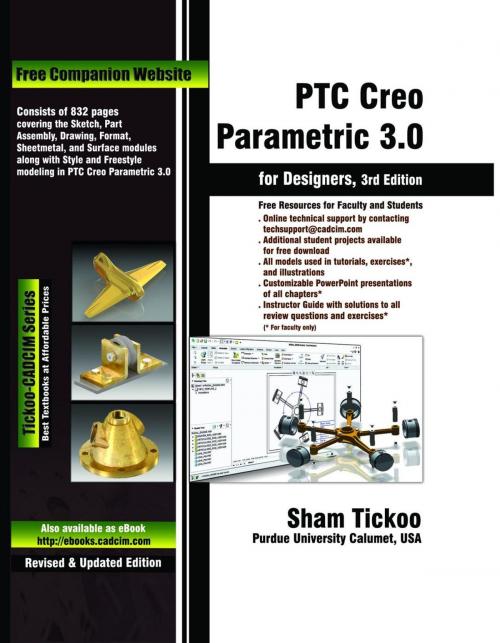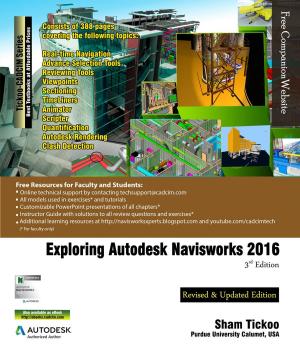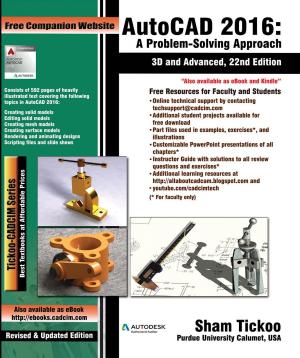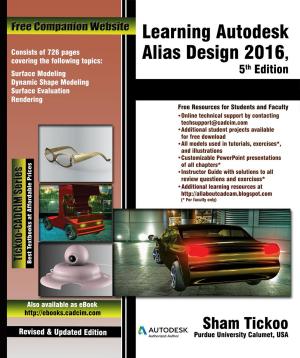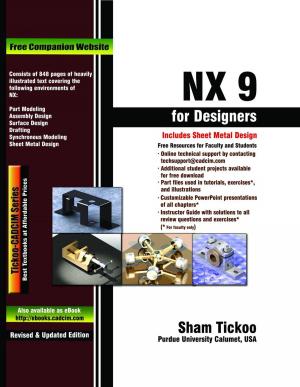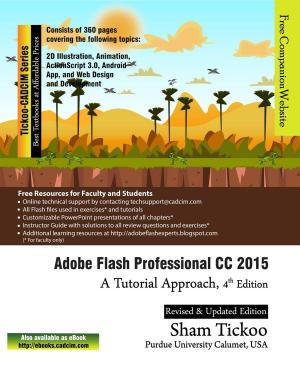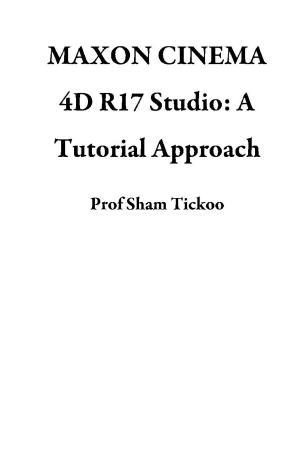PTC Creo Parametric 3.0 for Designers
Nonfiction, Science & Nature, Technology, Engineering, Mechanical| Author: | Prof Sham Tickoo | ISBN: | 9781386198529 |
| Publisher: | CADCIM Technologies | Publication: | August 31, 2017 |
| Imprint: | Language: | English |
| Author: | Prof Sham Tickoo |
| ISBN: | 9781386198529 |
| Publisher: | CADCIM Technologies |
| Publication: | August 31, 2017 |
| Imprint: | |
| Language: | English |
The PTC Creo Parametric 3.0 for Designers textbook has been written to enable the readers to use the modeling power of PTC Creo Parametric 3.0 effectively. The latest surfacing techniques like Freestyle and Style are explained in detail in this book. The textbook also covers the Sheetmetal module with the help of relevant examples and illustrations. The mechanical engineering industry examples and tutorials are used in this textbook to ensure that the users can relate the knowledge of this book with the actual mechanical industry designs. The salient features of this textbook are as follows:
• Tutorial Approach
The author has adopted the tutorial point-of-view and the learn-by-doing approach throughout the textbook. This approach guides the users through the process of creating the models in the tutorials.
• Real-World Projects as Tutorials
The author has used the real-world mechanical engineering projects as tutorials in this textbook so that the readers can correlate them with the real-time models in the mechanical engineering industry.
• Tips and Notes
Additional information related to various topics is provided in the form of tips and notes.
• Learning Objectives
The first page of every chapter summarizes the topics that will be covered in that chapter. This helps the users to easily refer to a topic.
• Self-Evaluation Test, Review Questions, and Exercises
Every chapter ends with a Self-Evaluation test so that the users can assess their knowledge of the chapter. The answers to the Self-Evaluation test are given at the end of the chapter. Also, the Review Questions and Exercises are given at the end of each chapter and they can be used by the Instructors as test questions and exercises.
• Heavily Illustrated Text
The text in this book is heavily illustrated with the help of around 1400 line diagrams and screen capture images that support the tools section and tutorials.
The PTC Creo Parametric 3.0 for Designers textbook has been written to enable the readers to use the modeling power of PTC Creo Parametric 3.0 effectively. The latest surfacing techniques like Freestyle and Style are explained in detail in this book. The textbook also covers the Sheetmetal module with the help of relevant examples and illustrations. The mechanical engineering industry examples and tutorials are used in this textbook to ensure that the users can relate the knowledge of this book with the actual mechanical industry designs. The salient features of this textbook are as follows:
• Tutorial Approach
The author has adopted the tutorial point-of-view and the learn-by-doing approach throughout the textbook. This approach guides the users through the process of creating the models in the tutorials.
• Real-World Projects as Tutorials
The author has used the real-world mechanical engineering projects as tutorials in this textbook so that the readers can correlate them with the real-time models in the mechanical engineering industry.
• Tips and Notes
Additional information related to various topics is provided in the form of tips and notes.
• Learning Objectives
The first page of every chapter summarizes the topics that will be covered in that chapter. This helps the users to easily refer to a topic.
• Self-Evaluation Test, Review Questions, and Exercises
Every chapter ends with a Self-Evaluation test so that the users can assess their knowledge of the chapter. The answers to the Self-Evaluation test are given at the end of the chapter. Also, the Review Questions and Exercises are given at the end of each chapter and they can be used by the Instructors as test questions and exercises.
• Heavily Illustrated Text
The text in this book is heavily illustrated with the help of around 1400 line diagrams and screen capture images that support the tools section and tutorials.
